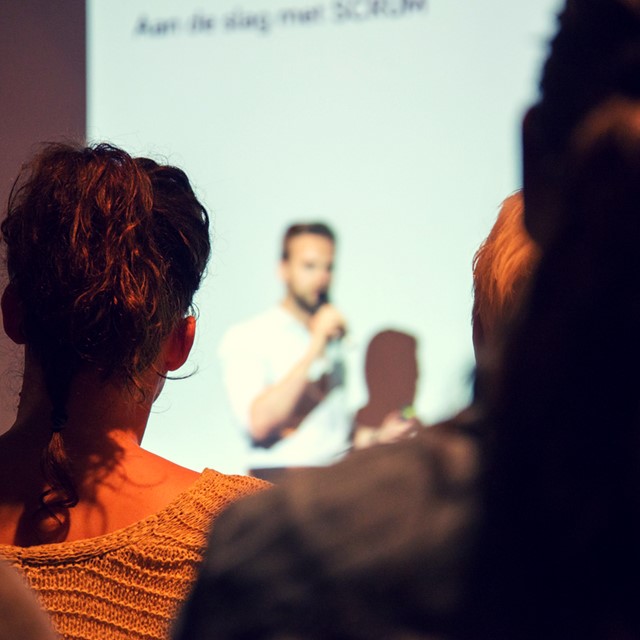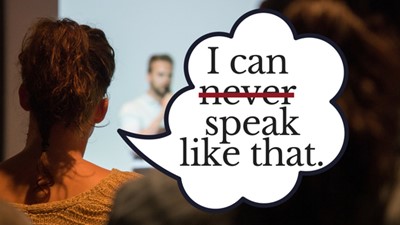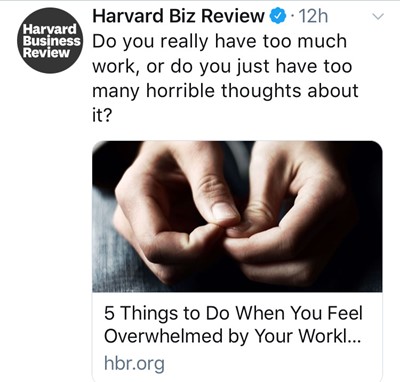
BY JENNY MAXWELL
Like other people overwhelmed by their workload, I did the predictable.
I hopped on Twitter.
And as if it had read my mind, Twitter provided me with a link I could not resist.
As I read “5 Things To Do When You Feel Overwhelmed by Your Workload,” I noticed that the advice was similar to some I’ve given to speakers over the years.
"People wait for their emotions to change before changing their behavior. However, changing your behavior is probably the best and fastest way to change your emotions (and thoughts)."
– Psychologist Alice Boyes
Change your self-talk
I always feel a little Oprah-esque when I offer this up, but it's made a big difference for my public speaking: I stopped talking myself out of being good and started talking to myself about purpose.
In her article, psychologist Alice Boyes writes:
The best self-talk helps you feel calmer and in control. It combines self-compassion and appropriate responsibility-taking (not too much, not too little).
Then she gives an example of changing your self-talk to feel less overwhelmed:
“I enjoy my work so I like to be busy. It’s natural that I’m going to feel overwhelmed sometimes. I can handle those emotions and make adjustments as needed.”
From my own experiences, I stopped saying “I am so nervous” or “Someone else could do a better job of giving this presentation” and started saying things like “I have information that can help people” and “I may be nervous at first, but that’s okay and it won’t last.”
I noticed the benefits right away. As I walked to the front of the room, I stopped undermining myself and my confidence. It’s one of the simplest but most important changes I’ve made to help myself as a speaker.
 Mindset change for presenters: When you stop comparing yourself to others and shift your self-talk about your capabilities, you set yourself up to succeed.
Mindset change for presenters: When you stop comparing yourself to others and shift your self-talk about your capabilities, you set yourself up to succeed.
Define (or re-define) success
“You might also be self-generating faulty thoughts about what it takes to be successful,” writes Boyes.
She suggests you examine your own perfectionism and determine whether the standards you’ve set for yourself are realistic--or even expected of you by others.
As a speaking coach, I’ve seen how this works in presentations, too.
Speakers can be too critical of themselves. This creates all sorts of problems, including:
- Procrastination, as they wait for the “perfect” idea
- Discomfort with helpful coaching and suggestions, because they feel those are more evidence of how they’re failing to meet a standard they’ve unrealistically set
- An exaggerated fear of appearing nervous, when the reality is their nerves are not apparent to anyone but themselves
- Comparing themselves to other speakers with a focus on their own weaknesses, rather than making the most of their unique strengths
That last one is particularly damaging for presenters, because the very best speakers do their own thing and make the most of their own talents. This can be tough to embrace, though, when you’re by nature competitive—and looking at others for a model of how to succeed.
One of Boyes’s suggestions:
Our assumptions and self-generated rules are often implicit. When you’re feeling miserable or blocked, that’s a great time to hunt down any hidden assumptions that are contributing to that.
 The Harvard Business Review tweet that "inspired" this consideration of mindset and public speaking.
The Harvard Business Review tweet that "inspired" this consideration of mindset and public speaking.
Stop waiting for your public speaking stars to align
If you’ve been intending to tackle your public speaking fears or waiting to pursue new opportunities until you feel more confident about your presentation skills, this concept might help you make the leap.
Boyes points out that there is no “right” time:
A classic catch-22 in psychology is that people wait for their emotions to change before changing their behavior. However, changing your behavior is probably the best and fastest way to change your emotions (and thoughts). When you start tuning into it, you will probably notice the pattern cropping up again and again.
For those of us who want to be better speakers, taking advantage of little opportunities can lead to big improvements.
Here are just a few simple, low-stakes ideas from my own experience:
- Volunteer to deliver a message or be part of a presentation instead of looking around to see who else you can recruit to do it.
- In workshop and training sessions, step up and participate rather than hang back and watch others do it.
- Join the speakers’ bureau at your company or with a nonprofit organization—and request groups you’ll feel comfortable speaking to. In my case, when I worked for a television station some years ago, I volunteered to speak to school groups to build my confidence.
And if you’re feeling overwhelmed and want to regroup, breathe slowly and find Alice Boyes’s complete article for Harvard Business Review here.






